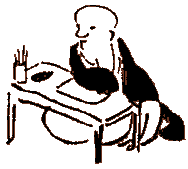|
|
|
|
Page seven
|
|
|
|
|
|
|
|
|
|
|
|
Right Action
Use your own hands, Dogen
Silence
Silence originates authentic speech. Dharma Teacher
Peace and reconciliation
The practice of peace and reconciliation Master Thich Nhat Hanh
Karma
Live in peace with Karma When you live with Karma Des boo ngoh
To work with impermanence
To contemplate impermanence on its own is not enough: Let’s try an experiment. Pick up a coin. Now if you let go or relax your grip, you will lose what you are clinging to. But there’s another possibility: You can let go and yet keep hold of it. You let go. And the coin is still yours, even with all this space around it. Sogyal Rinpoche
Theory and reality
There are those who look on death with a naive, thoughtless cheerfulness, When I think of them, I am reminded of what one Tibetan master says: “People often make the mistake of being frivolous about death and think, That’s a nice theory until one is dying. Sogyal Rinpoche
Fear of unknown
People have a hard time Out of a fear of the unknown, Thich Nhat Hanh
Being Peace
Smiling is very important. It is not by going out for a demonstration against nuclear missiles It is with our capacity of smiling, breathing, Thich Nhat Hanh
Suffering ends
If you can practice and find happiness you can find happiness too Desmond Chong
Emptiness
In order to have no suffering, When you know When you know no-self Des Boo-ngoh
Unity, Presence and Trasformation
Keep to unity with shifting. With constant presence, Tao-hsin (580-651)
It is not that dificult
Dying is not that difficult Death is not separate from life. Des Boo-ngoh
Necessary awareness
To shed light of mindfulness on all things, The ancient Zen Masters used to say, “If we live in forgetfulness, Master Thich Nhat Hanh
Teachings about Meditation - 3
To relax means to be spacious and to relax the mind of its tensions. It is like pouring a handful of sand onto a hot surface, and each grain settles of its own accord. Sogyal Rinpoche – (End)
Teachings about Meditation - 2
To release means to release the mind from its prison of grasping, On a deeper level, the realization and confidence that arise from your growing understanding of the nature of mind Sogyal Rinpoche – (To be continued)
Teachings about Meditation - 1
When I teach meditation, I often begin by saying: To bring your mind home means to bring the mind into the state of Calm Abiding through the practice of mindfulness. Sogyal Rinpoche – (To be continued)
True Buddhism
It's not just talking; To be a true Buddhist Desmond Chong
Splendor of the virtues
Sariputra, this buddha-field is always thus pure, For example, Sariputra, the gods of the Trayastrimsa heaven all take their food from a single precious vessel, Just so, Sariputra, living beings born in the same buddha-field Vimalakirti Nirdesa sutra I
Wisdom of compassion
To realize what I call the wisdom of compassion is to see with complete clarity its benefits, We need to make a very clear distinction between what is in our ego’s self-interest It is from mistaking one for the other that all our suffering comes. Sogyal Rinpoche
When am I a Buddhist?
I am a Buddhist I am a Buddhist I am a Buddhist Desmond Chiong
When am I a Buddhist?
I am a Buddhist I am a Buddhist I am a Buddhist Desmond Chiong
When am I a Buddhist?
I am a Buddhist I am a Buddhist I am a Buddhist Desmond Chiong
When am I a Buddhist?
I am a Buddhist I am a Buddhist I am a Buddhist Desmond Chiong
| |
|
|
|
| Drawings |
|
|

